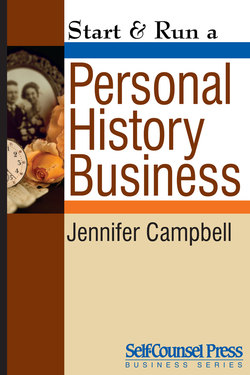Читать книгу Start & Run a Personal History Business - Jennifer Campbell - Страница 30
На сайте Литреса книга снята с продажи.
2.2 Financial circumstances
ОглавлениеAssuming you’re working from home and you have a spouse, partner, and/or children, it’s important that everyone understands how important your business is to you. Ideally, they will be in full support and encourage you. If not, you have some challenges ahead, but they’re not insurmountable.
If you’re employed outside the home now, try to lay the groundwork for your business before you quit, and make a realistic plan for finally kissing that job goodbye and doing what you want to do. Start saving now. If you’re laid off and get a severance package, get some advice from an accountant or financial planner about how much you can safely put aside for your business start-up. The beauty of a personal history business is that there can be very little start-up cost. But you still want to have some cash put away for those rainy days when you have no clients on the horizon and the basement starts leaking.
As in any business, it may be a while before you start to see a tidy profit. There will be a learning curve where you might not be charging as much as you will once you’ve got some experience and a reputation. If a partner or spouse can carry you through lean times, great. But if you’re on your own or you need to contribute to the household cash flow, you might want to have an alternate income stream or at least a financial cushion. You’ll spend money on a leap of faith and tell yourself it’s an investment, not an expense (you’ve heard that one before, right?). That’s true, but there will be times when you might feel guilty and foolish for “wasting” your family’s money. My advice: Don’t!
It took me a long time to realize that in order to make money you have to spend money. I think this is a misguided mindset of a first-time businessperson. After decades of having everything supplied to you by an employer — paper, pens, computers with all the bells and whistles, and a technician to do the upgrades — one day you’re looking around for some staples and you realize you have to go and buy them! When I was starting out, I told myself I wouldn’t spend any money until I got my first client. I passed up the chance to attend a personal historian conference because I wasn’t making any money yet and it seemed like such an extravagance. It was expensive, but I’m convinced that had I gone, I would have learned so much and made valuable connections; it would have been a very wise investment. I would have really kick-started my business, rather than having it cough and choke as it sputtered to life.
If you’re leaving a job and a regular salary, there will be some financial sacrifices for a while. If you have a spouse or partner, have a frank and open discussion about finances; about your initial investment in your business, your goals, and what the next steps are if you don’t meet them. The key is to set realistic expectations, set your priorities, tighten the household belt, and (keeping the analogy) buckle down and work hard to meet your goals.
If you have children, explain to them what having your own business means to you and why you’re doing it. The belt-tightening might mean they don’t get the latest and greatest gadget, or that Mom or Dad has to work late. Kids are far more resilient than we give them credit for, and the lessons you teach them by building your own business will stay with them throughout their lives, long after the latest gadget gives out! Involve them in helping you set up your office or doing some simple tasks. If they’re older, you can increase their responsibilities and pay them hourly (or even a salary). Check with your tax accountant for the implications of adding any part-time employees.
